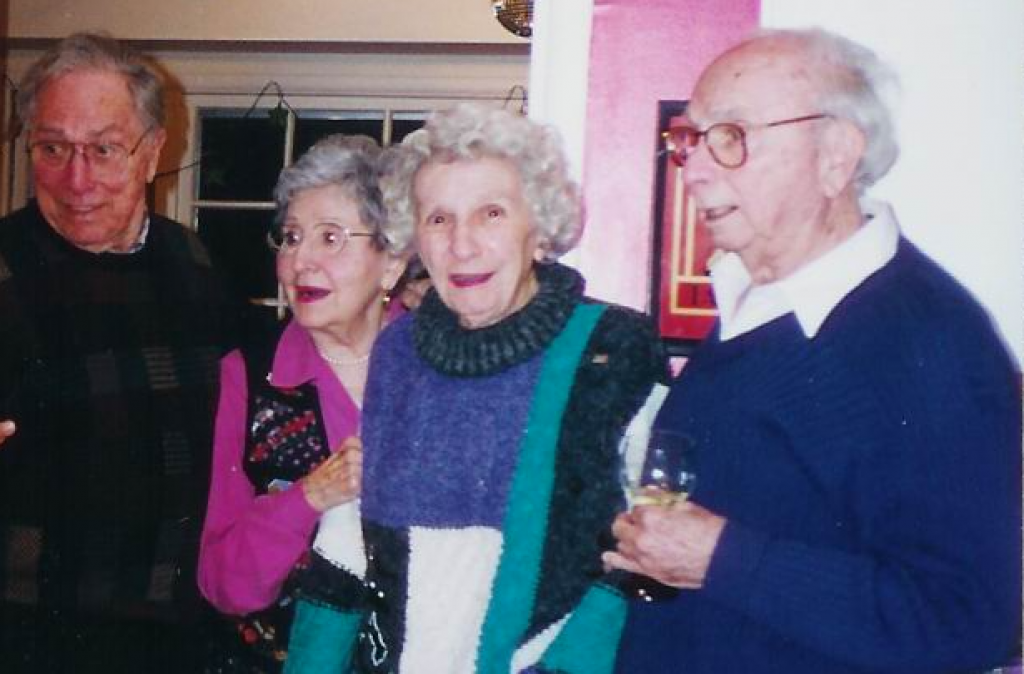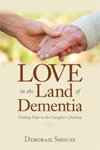Posts Tagged ‘love’
Five Ways to Make Valentine’s Day Special for a Loved One Living with Dementia
My parents liked to celebrate Valentine’s Day with dinner and dancing. Years into my mom’s Alzheimer’s journey, my parents’ love hadn’t diminished, but my mom’s capacity for going out to dinner and dancing had drastically decreased. I saw how blue my father was—one more event he had to give up, one more change in the woman he loved—and I searched for alternatives that might cheer him up. Here are five ways to make Valentine’s Day special.
Look for a favorite thing. Seek one simple pleasure your loved one might enjoy. Mom loved potato soup and chocolate and fresh strawberries. These were part of our celebration.
Nurture yourself: include your own favorite thing. Bring yourself into the celebration and include something that makes you happy. I brought foods my father and I both liked as part of our little party.
Pick several ways to express your love. Poetry, music, gifts, flowers, and photo albums—you can use any of these resources as a catalyst to talk about your feelings. Dad and I sang Mom old show tunes and love songs, music she really enjoyed. Mom adored Shakespeare; we had a couple of sonnets on hand. She and Dad had once created a beautiful flower garden; Dad brought her a single red rose.
Take joy in the simple act of expressing yourself. Being with my mom was a chance to really practice the mythical “unconditional love.” Mom couldn’t tell me she loved me. During one Valentine’s Day celebration, she fell asleep while I was holding her hand and talking sweetly to her. But there was a comfort in expressing my love and I kept on talking.
Celebrate love in all its glorious guises. During their long marriage, my father had walked into a room millions of times and often, Mom had been busy and hadn’t particularly smiled or remarked. But with her dementia came a deep dependency on Dad. When Dad walked into a room, my mother’s face lit up. My father basked in that light. The sparkle in my mother’s eyes was the new, “I love you, darling.” The light said everything my mother could no longer say.
Deborah Shouse is the author of Connecting in the Land of Dementia: Creative Activities to Explore Together and Love in the Land of Dementia: Finding Hope in the Caregiver’s Journey.
The Ways the Cookies Crumble
Each woman would bring a batch of home-baked cookies, she wrote. We would then get to sample all the cookies and bring a bag of treats home to our families. I adored the idea of getting to bring my teenage daughters such an array of home-baked sweets. I envisioned a room filled with charming baskets of star-shaped sugar cookies, generously topped with red or green frosting. I imagined a jolly basket of Santa cookies and a fragrant ginger-scented array of reindeer cookies. I fantasized about thumbprint cookies, shaped like snowflakes and gooey with jam, and about silky buttery sandies melting in my mouth. And…
Then I realized the implication; these holiday cookies would not only need to be beautiful, creative, and delicious, they would need to be presented in festive and unusual ways. I had never really made anything other than the occasional clumpy chocolate chip, peanut butter, or oatmeal cookie. Why hadn’t my mother been a more glamorous baker, I fretted, as I rummaged in the refrigerator for something to make for dinner. She only made the plainest of cookies—date crumbs, peanut butter, and chocolate chip. As I boiled water for pasta and heated up the jar of marinara sauce, a number floated into my head and I dialed it.
“If I go to this party, will you help me with a recipe and a cute idea for presenting the cookies?” I asked my friend Judith, who was graced with five-star baking abilities.
“Of course,” she said. Judith’s aplomb would fit right in at such a gathering. Briefly, I wondered if she could attend in my place and just deliver my treats to me.
I told my daughters the good news—in several weeks we would have our own private holiday cookie festival. Since our sweets were usually made by some giant corporate entity, they were ultra-excited.
A week later, I received a thick packet in the mail. Judith had selected a number of “easy” recipes for me. I smiled as I looked over the pictures of adorable cookies with a cute holiday twist.
I frowned as I read through the baking instructions; each cookie demanded its own specialized pan, gourmet tool, thermometer, or esoteric ingredient.
As the day of the cookie party neared, I had no recipe, no cookies, no plan, and nothing good to wear.
That night at dinner, I said, “I don’t think I can go to the party.”
“Why not?” Sarah said sharply. She was thirteen and took promises and plans very seriously. Plus, she had a highly sophisticated taste for sweets and was looking forward to expanding her repertoire.
“I can’t just walk in carrying a paltry tray of blobby looking chocolate chip cookies.” My throat constricted and I wished I were a mother who could whip up a butterscotch soufflé from ingredients that just happened to be in my kitchen cabinets.
“Why not?” my older daughter Jessica said. Even during the holiday season, she kept to her black-themed wardrobe. She looked Gothic and serious as she said, “Everyone else will be all silver bells and fancy sprinkles. You will represent the good old- fashioned approach to the holidays; your simplicity will be refreshing.”
I took a breath and considered her words. If worse came to worse, I could always pretend I never saw those cookies before in my life.
That evening, my daughters and I made chocolate chip cookies and put them in a tin lined with aluminum foil. In honor of the season, I unearthed a shiny red bow to top the tin.
Walking into the party was like walking into a fairyland. Christmas lights lined the windows and a sparkling tree spread its branches into the living room. The dining room table looked like the December cover of Gourmet magazine. Stars, hearts, Christmas trees, snowmen, all the icons of the season were glowing with icing and sprinkles.
Some cookies were nestled in hand-made wreathes. Others shone from star-shaped or tree shaped boxes. A miniature set of reindeer surrounded a bejeweled fruitcake. A galaxy of colorful star-shaped cookies decorated a tiered silver-server. I admired each display while looking for a quiet corner where I could tuck in my tin of chocolate chips. I finally settled them between candy cane cookies and gingerbread Santas.
My hostess offered me champagne and the conversation flowed. Then she announced, “It’s time to gather the cookies.” She had a large silver gift sack for each of us and encouraged us to take several of each cookie. As I toured the table, I sneaked a look at my humble confection. What if no one took any? What if I had to bring the whole batch home? What if… The doubts daunted me as I filled my sack with delectables.
“Who made the chocolate chip cookies?” someone asked. The room quieted and my breath quickened. As the silence spread, I finally said, “I did.”
“What an interesting idea,” someone said.
“I never would have thought of it. It’s comforting. These cookies remind me of my mother and home.”
I smiled as I put three Santas in my sack and headed for the reindeer.
That evening my daughters and I had a magnificent holiday feast, consisting of cookies, cookies, and cookies.
“Here’s the strange thing, Mom,” Jessica said, as she leaned back, sated. “Your cookies are really just as good as any of them. Not as cute, but just as delicious.”
“More delicious,” Sarah said.
I smiled, thinking that about my mom’s cookies when I was growing up. Maybe there was something about the plain old recipes offered in the plain old way, so sturdy, so unglamorous, and yet so deliciously like coming home.
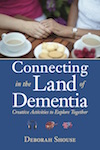
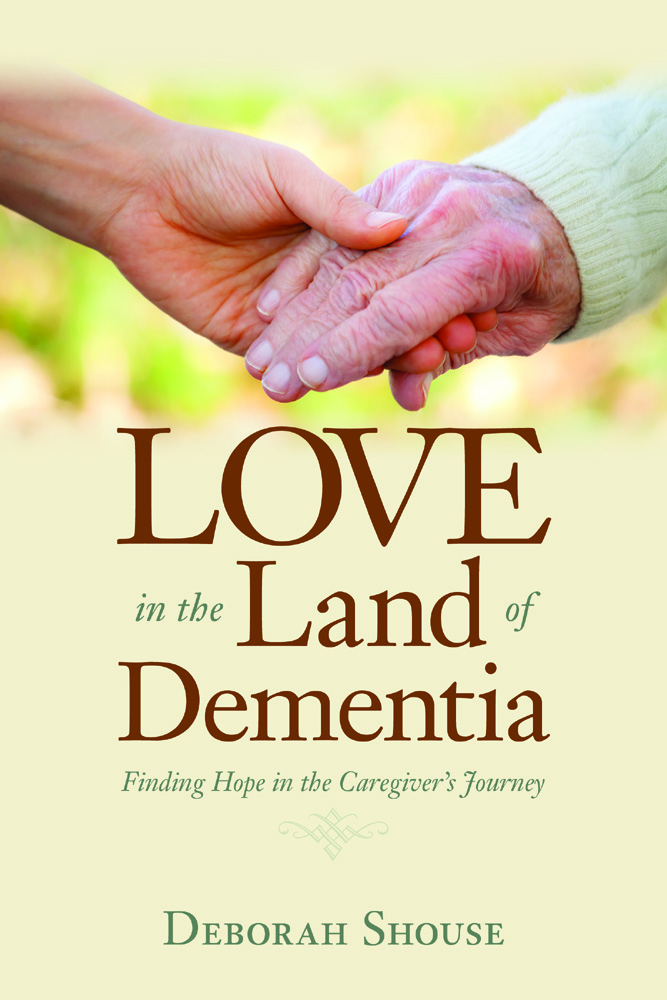
Inside Dementia: Finding Gifts in the Journey
“My husband and I have been married for 53 years,” a woman with delicately curled silver hair and mournful eyes told the group. “But in the two years since he was diagnosed with dementia, our relationship has changed.” She dabs at her eyes with a tissue and takes a breath. “It has grown even stronger. We are closer than we’ve ever been.”
Ron and I were in a conference room of caregivers in Ft. Wayne, Indiana, presenting for the Greater Indiana Chapter of the Alzheimer’s Association. We had just shared my story, Love in the Land of Dementia, and we were all talking about the gifts we have found in the dementia journey.
Another woman, whose husband was newly diagnosed, talked about her frustration and impatience before the diagnoses.
“Now that I understand what is going on, I have vowed to be more patient. I don’t want to waste a minute of our time together.”
“My husband doesn’t know who I am right now,” another woman said. “But the other day, he gave me such a compliment. He told me, ‘I want to marry you.’”
She told us how she rummaged in her cedar chest and showed her husband their marriage certificate. He read it with interest. Then he looked at her, eyes shining, and repeated, “I want to marry you.” Those words, so filled with love, lifted her spirits immeasurably. “To think that even now, when he doesn’t remember much of our lives together, he still loves me so much, that means a lot to me.”
She smiled, as we all applauded this amazing love.
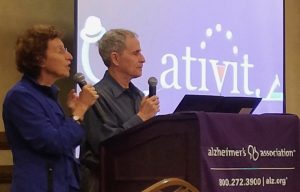 We heard more stories of amazing love at our earlier presentation in Merrillville, Indiana. When we talked about the gifts and blessings we had each discovered in the dementia journey, one woman told us, “I find it an honor to take care of my mother. She has done so much for me and I am lucky to get to care for her right now. I am glad to be able to show my unconditional love for her.”
We heard more stories of amazing love at our earlier presentation in Merrillville, Indiana. When we talked about the gifts and blessings we had each discovered in the dementia journey, one woman told us, “I find it an honor to take care of my mother. She has done so much for me and I am lucky to get to care for her right now. I am glad to be able to show my unconditional love for her.”
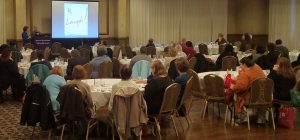
People shared many blessings—patience, the increased ability to live in the present, gratitude, flexibility, humor—but a deepening of love was the overarching message. We felt it during our own caregiving journeys, and we felt it deeply in the presence of those caregivers.
“The best and most beautiful things in this world cannot be seen or even heard, but must be felt with the heart.” Helen Keller
To learn more about the work the Greater Indiana Chapter of the Alzheimer’s Association is doing, please visit : https://www.alz.org/indiana/


An Insider’s Look at True Love: Charlie and Elizabeth’s Story
For years, I interviewed fascinating couples every week for a column in the Kansas City Star. Talking to people who are in love is always inspiring; often couples have to overcome enormous obstacles to bring their relationship into reality. One of my favorite stories stars two friends whose love and cosmic connection shines out from their faces and rings out with their words. Here is an short version of their beautiful story, an insider’s look at true love.
**
The coffee date was going better than Charlie, age 60, could have ever imagined. Just a month earlier, his best friend had burst into Charlie’s dark apartment and roused Charlie from his lethargy, saying, “You need to open up these windows and let some light in. You should start dating.”
“Who would go out with a guy who has Early Onset Alzheimer’s?” Charlie asked his friend.
“Maybe you should find out,” his friend replied.
So Charlie Miller pried himself out of his depression and joined eHarmony. And this coffee date with Elizabeth Hack was the result.
Elizabeth, age 55, was brilliant, interesting, energetic, curious, and shared many of Charlie’s interests. When she asked Charlie what he liked to do, he mentioned listening to music, attending theater, visiting with friends and volunteering for the Alzheimer’s Association.
Elizabeth knew nothing about Alzheimer’s. She asked, “Does someone close to you have the disease?”
“Yes,” Charlie answered. He wanted to say more but the words stuck in his throat. He had never envisioned this casual meeting could possibly turn into a romance. Yet he was already comfortable with Elizabeth and felt their relationship was meant to be.
Over the weeks, they continued seeing each other, meeting at concerts, going to plays, and exploring new restaurants. As their friendship deepened. Charlie knew he had to share his diagnosis with Elizabeth and he worried she wouldn’t be able to accept it.
But before he had a chance to broach the subject, Elizabeth, wanting to learn more about Alzheimer’s and about Charlie’s interests, visited the local Alzheimer’s Association website and noticed a picture of Charlie, as a volunteer and a person who has Alzheimer’s. She was shocked, dismayed, and confused. But she was also in love with Charlie; his diagnosis did not diminish her deep feelings for him.
 Charlie suggested she meet with his social worker at the Association to learn more about the disease. Elizabeth did that and though the information was daunting, her connection with Charlie was strong and true; she, too, felt they were destined to be together.
Charlie suggested she meet with his social worker at the Association to learn more about the disease. Elizabeth did that and though the information was daunting, her connection with Charlie was strong and true; she, too, felt they were destined to be together.
They began traveling and made plans to move in together. In a vineyard restaurant in Napa Valley, Charlie proposed and Elizabeth said Yes. Today, they are living happily, grateful they have found each other
“None of us know what will happen next,” Elizabeth says. “Just the other night, we were at a dinner party. One friend was just released from the hospital after heart surgery, and another friend was facing a hip replacement. I felt concerned for my friends and I felt so lucky that Charlie and I were happy and together. We are dedicated to living with joy and curiosity in the present moment.” 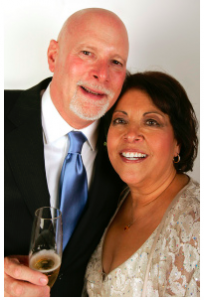
Deborah Shouse is the author of Connecting in the Land of Dementia: Creative Activities to Explore Together and Love in the Land of Dementia: Finding Hope in the Caregiver’s Journey.
Expanding My Definition of Love
Love comes in so many magical guises. My journey with people who have Alzheimer’s has expanded and deepened my understanding of love. Here are some insights from others.
My friend Vicki always inspires and teaches me. She has early onset Alzheimer’s and her outlook is an embodiment of grace and spirit. She writes: “I have lost both friends and family members since I have dementia. Some people are just so uncomfortable that they just cannot bear to see me go down hill. I have lost a very good friend who just can’t seem to handle it. I know that these people love me but they do not have the emotional fortitude to see the daily loss. You will find out who really loves you when you get dementia because these are the people who will be there for you when you need them.” — Vicki Stoecklin, Kansas City, Mo, retired designer
The True Meaning of Unconditional Love
Linda Fisher is a tireless advocate and a caring person. Her words really move me. “Caring for my husband Jim taught me the true meaning of unconditional love. I became fiercely protective of him and learned to love him ‘as is’ without looking back on the man he had been or forward to the man he would become. My love for him continued to grow throughout the ten years of his dementia, as he became dependent on me to be his advocate in all aspects.” — Linda Fisher, Sedalia, Mo, retired office manager, Central Missouri Electric Coop http://earlyonset.blogspot.com Early Onset Alzheimer’s: My Recollections, Our Memories (2012)
The Full Range of Emotions
Kelly Sheet, founder of the SpunkyCaregiver, offered these deep insights: “I have learned that love transcends any words and appearances. When someone has dementia, love is shared through energy and feeling. You can be vulnerable with people who are living with dementia. And it is a relief to be so open. Day-to-day we are expending energy to protect ourselves from saying too much or too little or the wrong thing. The great gift of loving people with dementia is that you can let go of those ideas, experiment with what a full range of emotions actually feels like. Without being judged, you can laugh spontaneously at some goofy moment, dance with abandon or hold hands with a stranger. Loving people with dementia helps me to feel alive. The hundreds of seniors I have known over the years have really taught me how to love more freely.” — Kelly Sheets, Founder, Sisters, Or, www.TheSpunkyCaregiver.com,
Every person teaches us more about love.
Deborah is the author of Love in the Land of Dementia: Finding Hope in the Caregiver’s Journey.
Learning about Love through the Dementia Journey
This month, I’ve been asking myself and others, What have you learned about love from your dementia journey? Here are some of the profound answers:
I learned that it is redefined. I loved my mother as my parent, and then learned to love her as a child. And I would not trade that experience for anything. Pamela J. Van Ahn, Executive Director at Caring Together in Hope, Inc., Atlanta, GA
I have learned that love remains, even as memory fails. Long after your name is forgotten, there are still frequent glimpses of recognition that are very meaningful. The Alzheimer’s patient does not become “a different person”. They are much more “still there” than easily meets the eye. With Alzheimer’s disease, things that have emotional context are remembered the longest, and love is a strong emotion. Max Wallack, research intern in the Molecular Psychiatry in Aging Laboratory at Boston University School of Medicine, Boston MA.
I have learned so many lessons regarding love through my mothers journey with dementia. Here are just a couple of them. There are multiple levels of unconditional love. Each one is more precious and runs deeper then the next. “Letting Go” of our need to control is one of the most loving things we can do for a person with dementia and ourselves. Allowing a person with dementia to be in a loving respectful relationship, even if it might be with someone unexpected, is a gift to all and does not mean they love us less. Love runs much deeper than a name. We need to stop quizzing a person with dementia to check if they know and love us. A name has nothing to do with the bond and connection between two souls. Lori La Bey, Founder of Alzheimer’s Speaks , St. Paul, Minnesota, www.AlzheimersSpeaks.com
Deborah is the author of Love in the Land of Dementia: Finding Hope in the Caregiver’s Journey.
Appreciating the Power of Love
“How long have you been together?” the younger couple asked Ron and me.
“Twenty-two years,” we answered.
“Wow!” they said. They’d been in love for seven months and our decades-long romance must have seemed exotic and slightly unbelievable.
“What are the secrets of a good relationship?” they asked. “Please share your wisdom.”
First, Ron and I basked in the idea that two people believed we possessed actual wisdom! Then we shared our insights.
How We Learned about Love
Our insights came from growing as individuals and as a couple during our wonderful long relationship and from earlier relationships that had helped us become our true selves. We also learned from watching our parents maintain their relationships in the face of dementia.
When Ron’s father Frank was in a memory care unit, Ron’s mom Mollie told her husband, “I love you so much.” Frank replied, “Not as much as I love you!.” Those were some of Frank’s last words and that sentence stayed with Mollie through and beyond her grieving.
During my growing up years, my father was circumspect in declaring his love for Mom. But when she slipped into dementia, Dad showed me what a true romantic he was. He treated her like he was courting her; he showered Mom with compliments and kisses and frequently he expressed his love for her. Even when she could no longer talk, she still enjoyed her favorite foods—he faithfully fed her sliced strawberries and chocolate candies.
Love Me Tender, Make Me Laugh, Always Have My Back
My parents were my role models and I also learn an enormous amount from the couples I interview every week for the love story column I write for the Kansas City Star Magazine. Here are some of the qualities people most love about their life partners and spouses.
Loves me just as I am
Takes care of me/Always has my back
Makes me laugh
Shares my values/ Complements me
Works hard/ Is honest and reliable
Always puts other people first/ Always puts me first
Inspires me to be better/ Appreciates me
Love Lights the Way
Some months ago, Oprah had author, visionary and cultural mid-wife Jean Houston on her TV show. “What do you wish people knew?” Oprah asked Jean.
“I wish people knew how powerful love is,” Jean answered.
That was one of the grandest lessons from my journey with my mom through her dementia: the power of love. Her love lasted all her life, far beyond her memory of things and people. Her love was a spark that lit up her life and mine.
A Love Story about Being Braver, Stronger, and Smarter
“Where there is great love there are always miracles.” Willa Cather.
I am always looking for wonderful love stories and I found this one when I was visiting the blog of one of my favorite writers, Louise Penny. I went to her site because I had just finished reading her book, A Fatal Grace, and I was feeling withdrawal. Plus, I knew her husband was living with dementia and I thought she might have some insights. She has some deep insights and she has generously given me permission to share them with you.
From Louise Penny:
Michael no longer knows my name. And now needs help eating. He can no longer walk on his own, and cannot read, or do puzzles. He barely speaks. He sleeps a lot, and I try not to take it personally, as though I am not doing a good job stimulating him. But, poor guy, when I try to stimulate him, by singing or dancing or finding games that might interest him, he looks at me, smiles. And falls asleep.
He remains the happiest man I know. Smiling at everyone. Reaching out for people’s hands.
And people are so very, very kind. I could never have predicted that when people visit, the first thing they do is go over to Michael, introduce themselves even though he’s known most for years, and chat. He loves it.
And then he falls asleep.
At bedtime, when he is finally and gratefully horizontal, I whisper in his ear. Something that came out of a horrific event in 2014, when Corporal Nathan Cirillo was shot and killed by a gunman on Parliament Hill, in Ottawa.
As the young man lay dying, men and women ran over to try to help him. One woman, Barbara Winters, knelt beside him and whispered in his ear that he was loved. That he was a good man and a brave man. She just kept repeating that.
And now, every night, after I turn the light out, I whisper in Michael’s ear that he’s a handsome man. A kind man. That he is thoughtful and funny and he makes everyone around him feel special. I whisper that he is loved, and he is safe. And then I kiss him good night. And he smiles.
Then I whisper to myself, “You are braver than you believe, stronger than you seem, and smarter than you think.” #
To learn more about Louise Penny and her books and her ideas, please visit https://www.facebook.com/louisepennyauthor
Or subscribe to her newsletter at www.louisepenny.com
Deborah Shouse is the author of Love in the Land of Dementia: Finding Hope in the Caregiver’s Journey.
Appreciating Who We Are
A man who is living with Alzheimer’s strides onto the stage and people applaud wildly. His son leans across the drums and hands him his guitar. His daughter, poised on the banjo, subtly reminds the man to look at the monitor so he can remember the words to the songs.
Everyone on stage is tuned into making the performance a great experience for the man and everyone in the audience is eager to hear from him. “So what if he sings Rhinestone Cowboy twice,” says one fan.
This scene is a snippet from Glen Campbell’s documentary, “I’ll Be Me.” As I watched Glen connect through his familiar music and bask in the support of his family and fans, I wished that every person could be so supported and celebrated, particularly those who are living with dementia.
As we approach Valentine’s Day, I wanted to share this essay about appreciating each of us for who we are. For me, it’s a reminder to celebrate love and the creative spirit in all their glorious guises.
Please Take a Bow
By Deborah Shouse
The stage thrilled with activities. One man juggled 12 balls. From overhead, a woman floated down on streamers of royal blue fabric, and then wound herself back up to the arena ceiling. Lithe performers dressed as jungle animals danced and tumbled. I sat in the audience, awed by the amazing creativity of Cirque de Soleil. I hardly knew where to look, so much was going on. But one performer consistently drew my attention. A woman dressed as a wood nymph walked around pointing to whichever feat she most admired. As a man juggled dangerously long sticks, the nymph held out her arms toward him, her gesture saying, “Ta da, Look at this!”
The singer burst into an acrobatic aria and the wood nymph ran towards her, unfurling her arms in another “Ta Da” gesture, focusing our attention and directing our applause. One act after another somersaulted, soared and danced and the wood nymph was always there to shine extra attention on them.
Afterwards, I stood in the corridors with Ron and our friends, Jacqueline and Michael, talking over favorite parts of the show.
“I really liked the wood nymph,” I told Jacqueline. “We should take turns doing that for each other.”
She agreed. But then we both wondered, what would we applaud? Jacqueline and I did our writing work practically immobilized in front of the computer. Michael was a legal aid attorney and Ron had an antique shop. The last time any of us had even somersaulted was eons ago, in our firefly laden summertime back yards. Yes, we juggled, but it was the usual middle class shticks, wildly tossing around work, family, exercise, community, friends and more. All the more reason, I thought, to find an appreciator who understood when we performed at our personal peak.
As we discussed the amazing acrobatic skills we had just seen, I imagined going over to Jacqueline’s. There she sits at her dining room table, her computer screen bright, her fingers nimble. She is a great writer and she is working her craft. I stand nearby, face the imaginary audience seated in her living room, and hold out my arms, gesturing proudly towards Jacqueline. She smiles shyly and I hold my appreciative pose. Then Michael walks through on his way to the kitchen.
“Hi Deborah, what are you up to?” he says.
I nod towards Jacqueline, who is writing briskly, and unfurl my arms towards her.
“Oh, yes, I see,” Michael says. He applauds. Jacqueline sits up straighter and allows herself a little bow. A lot of people don’t understand what hard work writing is and I am here to make sure her audience appreciates the subtlety and strength of this art form. Suddenly, Jacqueline stops. I imagine a drum roll as she presses her lips together, furrows her brow and stares into space. She is trying to think of the right word. We all know how hard that is–it’s the equivalent of the back flip followed by the double mid-air somersault. She shakes her head in despair. The audience is on the edges of its seats, mouths agape, hearts racing. Will Jacqueline find the word? Or will she crash to the ground, her sentence in shambles, her paragraphs paralyzed?
Finally, Jacqueline grins and returns to the keyboard, her fingers dancing. I point to her—“TaDa”– and her audience erupts into applause.
Meanwhile, while I daydreamed, the Cirque de Soleil arena was emptying. We walked to our cars and the image of the wood nymph stayed with me all the way home.
As Ron and I walked toward our house, I remembered a conversation we’d had several weeks ago. “Why don’t you ever mention how great the yard looks?” he’d said. “I’ve worked hard on creating this.”
I had started to defend myself. Then I realized he was right. I liked the yard but its lushness was part of my normal world, the world I rushed blindly past. I hadn’t taken time to appreciate all the effort Ron had put into creating it.
Now I stopped on the sidewalk. The porch light illuminated the plants and ivy as I swept my arms toward the yard, then back to Ron.
“Ta da!” I said, pointing to his lawn, then applauding him. He stared at me, and then smiled.
“Thank you,” he said. “Thank you for noticing.” He took a bow.
I followed him as he left the stage and went into the house.
Deborah Shouse is the author of Love in the Land of Dementia: Finding Hope in the Caregiver’s Journey.
Four Reminders to Enjoy the Moment
Every week, I have the joy of interviewing a couple and learning their love story. We talk about where and when they met, what they like about each other, and how they stay connected during life’s chaos and challenges.
Recently, I talked to a couple who met in their late seventies. Both had lost their spouses and both were amazed to fall in love again. When I asked how they kept their relationship strong, she answered, “Because of our age, we know we don’t have that much time left to be together. We enjoy every moment of every day.”
Since that conversation, I have thought often about her words: What would it be like to truly appreciate every moment? What would it be like to completely appreciate each person I spent time with?
Being present and appreciative were two of my goals when I spent time with my mom in her later years. One moment, I felt connected, holding Mom’s hand, sitting right next to her while pointing out interesting pictures in a magazine, and the next moment her head would be lowered, her energy drained and I felt alone and sad. But of course, I wasn’t alone; I was right next to my mother, still holding her hand. My task was to enjoy that quiet minutes as much as the time that Mom was interacting with me.
“Enjoy every moment of every day.” These quotes echo that important reminder .
Deborah Shouse is the author of Love in the Land of Dementia: Finding Hope in the Caregiver’s Journey.
